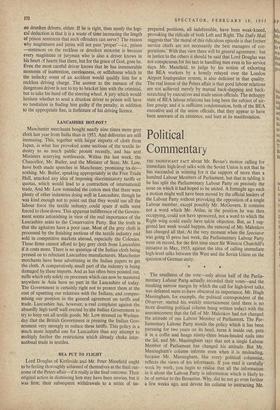Political Commentary
THE SIGNIFICANT FACT about Mr. Bevan's motion calling for immediate high-level talks with the Soviet Union is not that he has succeeded in winning for it the support of more than a hundred Labour Members of Parliament, but that in tabling it he has split the Parliamentary Labour Party on precisely the issue on which it had hoped to be united. A fortnight ago Rich a motion might well have been moved by the official leaders of the Labour Party without provoking the opposition of a single Labour member, except possibly Mr. McGovern. It contains not a word which Mr. Attlee, in the position he was then occupying, could not have sponsored, not a word to which the Right wing could easily have taken objection. But, as I sug- gested last week would happen, the removal of Mr. Malenkov has changed all that. At the very moment when the Spectator was going to press last week, the Parliamentary Labour Party went on record, for the first time since Sir Winston Churchill's initiative in May, 1953, against the idea of calling immediate high-level talks between the West and the Soviet Union on the question of German unity.
/ The smallness of the vote—only about half of the Parlia- mentary Labour Party actually recorded their votes—and the resulting narrow margin by which the call for high-level talks , was defeated seem to have obscured its importance. Mr. Hugh Massingham, for example, the political correspondent of the Observer, started his weekly entertainment (and there is no inore diverting political column being written today) with the announcement that the fall of Mr. Malenkov had not changed the attitude of one Labour Member of Parliament. The Par- liamentary Labour Party stands the policy whioh it has been pursuing for two years on its head, turns it inside out, puts it in a coffin and bangs ninety-three brass-headed nails into the lid, and Mr. Massingham says that not a single Labour Member of Parliament has changed his attitude. But Mr. Massingham's column informs even when it is misleading, because Mr. Massingham, like every political columnist, reflects the views of his informants. If you read it carefully' week by week, you begin to realise that all the information in it about the Labour Party is information which is likely to be of service to the Bevanites. Why, did he not go even further a few weeks ago, and devote his column to instructing Mr. ichael Foot in how to write the Bevanite manifesto against r. Morgan Phillips? Therefore, when Mr. Massingham said hat no Labour Member of Parliament had changed his attitude o the Soviet Union as a result of Mr. Malenkov's dismissal, it was a fair assumption that this was what the Bevanites wanted the public to believe. It confirmed my suggestion last week that the Left wing of the Labour Party would try as hard as Possible to rescue what they could from an awkward situation.
* * *
Mr. Bevan's motion is the form which this Left-wing attempt has taken. it is addressed far less to the Prime Minister than to the official leadership of the Labour Party—hence the exceed- ingly clever way in which it bases the demand for high-level talks on Mr. Attlee's motion of almost a year ago. It is an attempt, in short, to keep Mr. Attlee moving in the same direc- tion as he has been moving throughout the past year by putting hint_ on the spot, by throwing his own words back at him. The attempt cannot succeed, because, whatever Mr. Attlee's per- sonal ideas, the Right wing of the Labour Party, which is even more indispensable to him than the Left wing, will not allow it. The he Labour members who have added their names ,to Mr. Bevan's motion include none whom one would not expect to see there. The Parliamentary Labour Party is once again split on a major issue of foreign affairs—and along the old familiar lines. The question of high-level talks, which has become symbolic of a whole attitude to foreign policy just as the name of Munich became symbolic of the whole era of appeasement, is now dividing instead of uniting it.
Some newspapers have been making much of the fact that those supporting Mr. Bevan's motion include those who are usually called `middle-of-the-roaders.' It is as well to be quite disillusioned about their position. There are some genuine `middle-of-the-roaders,' like Mr. Kenneth Younger, who, from a policy point of view, occupy a sort of no-man's land between the Bevanites and the Gaitskellites. But a large number of them, including their most articulate spokesman, Mr. John Strachey, are quite as far to the Left as the Bevanites. For various reasons, they have gone out of their way to dissociate themselves from the Bevanite group. But in matters of policy they are indistinguishable from it. The day on which Mr. Strachey takes a different attitude to a major question of foreign . policy from that of Mr. Bevan will be a great day indeed, as great as if Locke had embraced the teachings of the Leviathan or Dr. Donald Soper had joined forces with the Vatican. But this is to dream. TRIMMER











































 Previous page
Previous page